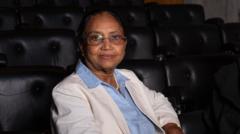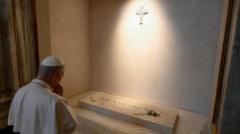Banu Mushtaq's remarkable achievement with her anthology "Heart Lamp" not only breaks new ground for Kannada literature but also brings attention to the resistance and resilience of Muslim women.
Historic International Booker Prize Win for India's Banu Mushtaq

Historic International Booker Prize Win for India's Banu Mushtaq
Banu Mushtaq becomes the first Kannada author to win the International Booker Prize, spotlighting the struggles of Muslim women.
Indian writer, lawyer, and activist Banu Mushtaq has made headlines by winning the prestigious International Booker Prize for her short story collection, "Heart Lamp." This groundbreaking achievement marks the first time a book written in Kannada—a language predominantly spoken in the Indian state of Karnataka—has received this international accolade. The anthology, deftly translated into English by Deepa Bhasthi, features 12 poignant stories chronicling the lives and struggles faced by Muslim women over the span of three decades, from 1990 to 2023.
Mushtaq's victory follows Geetanjali Shree's triumph with "Tomb of Sand," translated from Hindi, which garnered the award in 2022. Known for her insightful narratives, Mushtaq's work sheds light on the challenges posed by religious conservatism and patriarchal traditions, resonating strongly with readers. A review from the Indian Express highlights that "Heart Lamp" emphasizes "the value of attention" towards marginalized lives, underlining Mushtaq's subtle yet powerful storytelling approach.
Born and raised in a small Muslim neighborhood in Karnataka, Mushtaq's journey into literature began unexpectedly. With encouragement from her father, she transitioned from studying the Quran in Urdu to a convent school where the primary language was Kannada. Though she faced linguistic and cultural barriers, Mushtaq persevered, channeling her experiences into her writing. Her literary debut came in the midst of personal turmoil, as she navigated the challenges of a love marriage that initially confined her to domestic life.
In an evocative interview, Mushtaq shared her struggles with postpartum depression and the suffocating confines of societal expectations. A desperate incident of self-harm became a turning point, pushing her to reclaim her voice through writing. The characters in "Heart Lamp" exemplify this spirit of defiance and resilience. As noted in another review, Mushtaq refuses to let her female characters be merely "silent sufferers" but instead portrays their strength and complexities.
Her literary career, marked by countless awards and recognitions, has not come without sacrifice. Mushtaq faced significant threats for her outspokenness regarding women's rights, including a fatwa and attempts on her life. Nonetheless, she remains undeterred, persistently addressing gender and societal injustices through her writing. Reflecting on her career, she notes, "Even though the context evolves, the basic struggles of women and marginalized communities continue."
With numerous acclaimed works under her belt, including six short story collections and an essay compilation, Mushtaq continues to advocate for change through her art. Her latest English translated anthology, "Haseena and Other Stories," won the PEN Translation Prize in 2024, cementing her status as a formidable voice in contemporary literature.



















